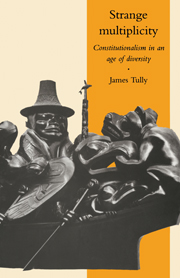Book contents
- Frontmatter
- Contents
- Preface
- Acknowledgements
- Illustration: ‘The spirit of Haida Gwaii’
- 1 Demands for constitutional recognition
- 2 Diversity and contemporary constitutionalism
- 3 The historical formation of modern constitutionalism: the empire of uniformity
- 4 The historical formation of common constitutionalism: the rediscovery of cultural diversity, part 1
- 5 The historical formation of common constitutionalism: the rediscovery of cultural diversity, part II
- 6 Constitutionalism in an age of cultural diversity
- Notes
- Guide to further reading
- Bibliography
- Index
6 - Constitutionalism in an age of cultural diversity
Published online by Cambridge University Press: 05 June 2012
- Frontmatter
- Contents
- Preface
- Acknowledgements
- Illustration: ‘The spirit of Haida Gwaii’
- 1 Demands for constitutional recognition
- 2 Diversity and contemporary constitutionalism
- 3 The historical formation of modern constitutionalism: the empire of uniformity
- 4 The historical formation of common constitutionalism: the rediscovery of cultural diversity, part 1
- 5 The historical formation of common constitutionalism: the rediscovery of cultural diversity, part II
- 6 Constitutionalism in an age of cultural diversity
- Notes
- Guide to further reading
- Bibliography
- Index
Summary
A summary of contemporary constitutionalism
The survey of the composite language of contemporary constitutionalism suggests that the constitutions of contemporary societies are considerably different from the picture given by the modern theories and the three authoritative schools. Where the machinery of modern constitutionalism has not clear-cut the living cultural diversity, because the sovereign people have said enough and refused to submit, the resulting common ground is a multiplicity. These constitutions are based on the sovereignty of culturally diverse citizens here and now, not on abstract forgeries of culturally homogeneous individuals, communities or nations. The aspectival character of the constitutions is not grasped by a comprehensive representation, but by participation in a practical dialogue where limited and complementary stories are exchanged. Constitutional negotiations are not monologues in an imperial voice, but intercultural dialogues where the postimperial majesty of audi alteram partem always has her final say.
These constitutions are not causal stages high above the ancient ones of early modern Europeans or Aboriginal peoples, but continuous with them. They preserve legal, political and cultural plurality rather than impose uniformity and regularity. There is not one national narrative that gives the partnership its unity, but a diversity of criss-crossing and contested narratives through which citizens participate in and identify with their association. Constitutions are not fixed and unchangeable agreements reached at some foundational moment, but chains of continual intercultural negotiations and agreements in accord with, and violation of the conventions of mutual recognition, continuity and consent.
- Type
- Chapter
- Information
- Strange MultiplicityConstitutionalism in an Age of Diversity, pp. 183 - 212Publisher: Cambridge University PressPrint publication year: 1995
- 1
- Cited by



